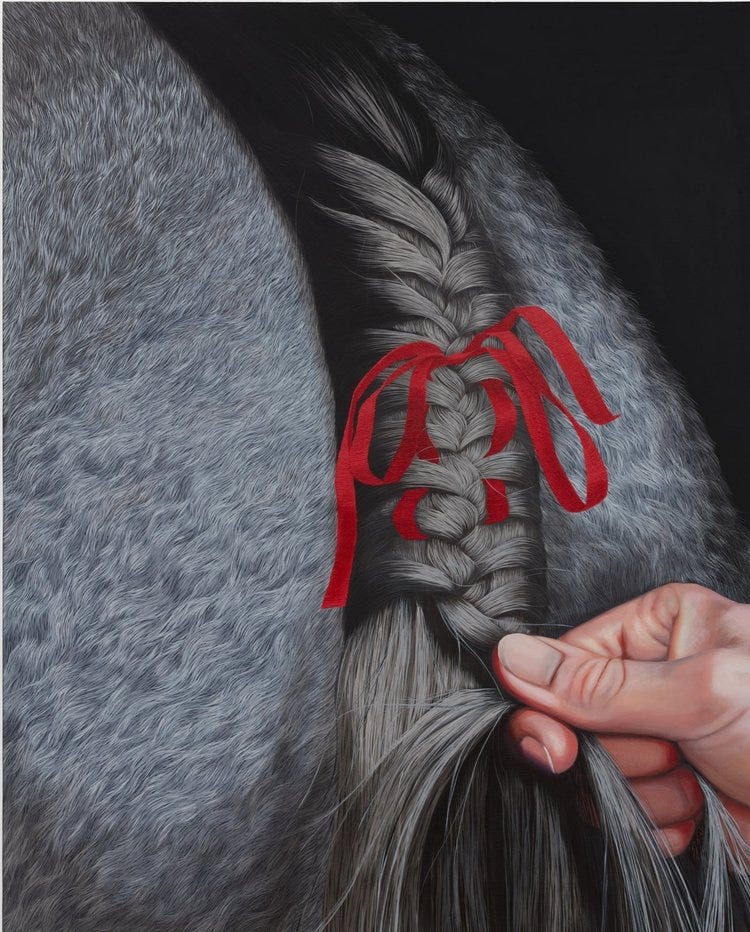A Cautionary Tail
This text was commissioned for Sarah Miska’s exhibition at Lyles & King A Cautionary Tail, the show’s title referencing a colored horse ribbon classification system, like hanky code for equestrians.
Common wisdom: don’t stand behind a horse. The power of thunder restrained by crop and bridle threatening to break free in a toss of the muzzle, mane fanning, a kick spraying gravel. Even raised in bondage, brushed shiny like lacquered mahogany, unruly mane and tail tamed into intricate braids, there’s a spirit of wildness liable to erupt at any moment from the sculpted flanks of an enormous backside. A hoof to the head could kill you. Never ever stand behind a horse with a red ribbon in its tail, the color cautioning a violent temper. Green signals a lack of experience; white marks a creature for sale; and pink says a mare in heat, she might be cranky. The cheapest horses are the most badly behaved. Your parents saved up to buy you one that might have otherwise ended up at a glue factory. Or maybe churned into dog food. She bit.
Everyone thought you wanted a horse. There was the sweatshirt with the cracking screen print of a chestnut mare, a patch of white streaked across its forehead, which you’d insisted on wearing til the heavy cotton twill was frayed at the sleeves, the fabric pulled tighter and tighter across your chest each year. The fastidious way you lined up your molded plastic figurines on the bedside table, each Stablemate, as the overpriced collectibles were called, frozen in a posture of equine power, mid-gallop or reared up on hind legs. The same action poses repeated by palomino stallions and thoroughbred friesians in the holographic stickers that covered your duotangs and binders, their peeling edges dirty with pencil shavings and other backpack debris. Plus the uninterrupted hours you’d spend buried in your sketchbook copying the pencil-shaded figures from instructional manuals, their rippled muscles spiderwebbed with swollen veins. You didn’t know how to put it into words, but really, you wanted to be a horse. You fantasized about the taste of the metal bit in your mouth. How your ears would twitch and pivot like two independent satellite antennae. The lick of the crop against your hulking haunches. The weight of someone riding you.
But instead you ended up with a stubborn creature named Galileo whose chosen form of passive aggression was lifting his tail and defecating at the most annoying times possible. You took lessons and then rode in competitions for a year or two, still haunted today by the itch of the jodhpurs, wet armpits hugged by a too tightly tailored jacket, the audience’s held breath and clenched rectums. You never won. Still you liked the rituals of caring for Galileo, the way you’d together submit to the precisions of methodical routine. Circular motions with the curry comb. Short strokes with the stiff brush. Long sweeping motions with the soft brush. A damp sponge gently caressing his delicate areas before detangling his mane and tail then removing trapped debris from his four feet with the hoof pick. A final polish with the stable rubber. Every few months or so you had to clean his sheath, massaging out any pellets of accumulated dead skin and smegma. He only trusted you to do this. To this day, your favorite perfume is a pungent musk with base notes of leather and civet that reminds you of the stable’s special stink.
After Galileo disappeared, you never rode again. It was a mystery how he escaped the paddock gate, slipping out without a trace of forced exit. Maybe someone stole him from the boarders but realistically who would have wanted this 900-pound miscreant who bit and shit at all the wrong times, even if you loved his gigantic beauty, the slope of his high forehead, the swerves and curves of his throat, shoulders, and lumbar spine. You imagined he must have jumped the paddock fence and cantered down the dirt path, before breaking into a gallop and then tearing into the October wind, nostrils flared, never again to hypnotize you with the dexterity of his lips, rolling left to right, as he sifted through grains and gravel. At first the horse people said it was only a matter of time before he’d turn up, wandering back, guided by a ferocious hunger for bales of hay and his salt lick. But no one ever saw him again, in the flesh that is. For years to come, his black eyes would stare back at you in dreams, two bottomless pits of reckless courage, an unchanging image of both the pleasures of control and thwarting it.



